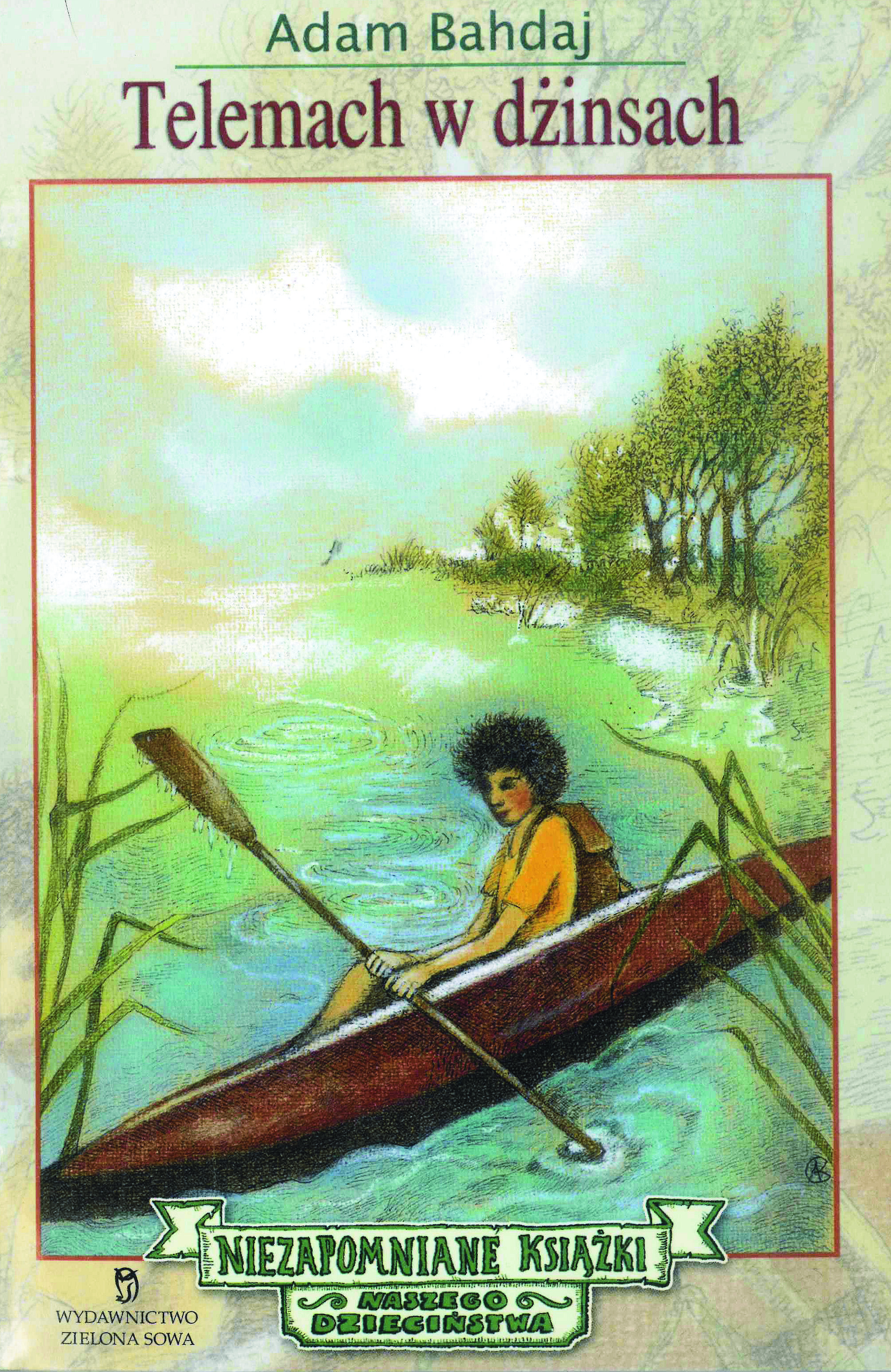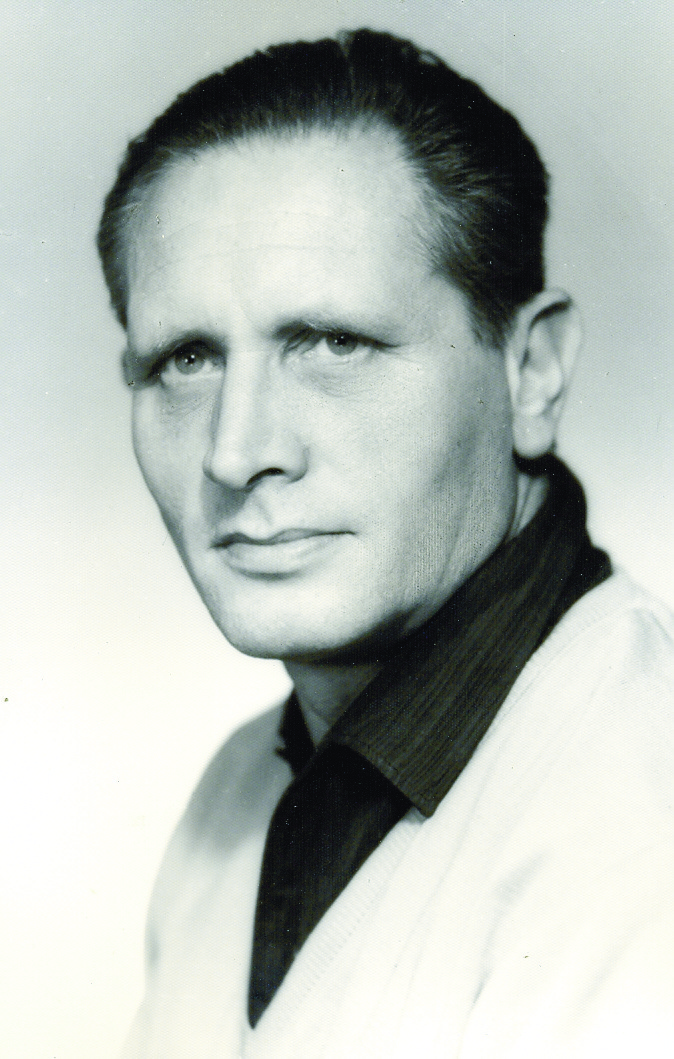Title of the work
Country of the First Edition
Country/countries of popularity
Original Language
First Edition Date
First Edition Details
Adam Bahdaj, Telemach w dżinsach. Warszawa: Krajowa Agencja Wydawnicza, 1979, 291 pp.
ISBN
Genre
Novels
Target Audience
Crossover (Children, teenagers)
Cover

Cover from the edition Kraków: Zielona Sowa, 2004, 216 pp.
Author of the Entry:
Summary: Ilona Szewczyk, University of Warsaw, szewczyk@al.uw.edu.pl
Analysis: Marta Pszczolińska, University of Warsaw, m.pszczolinska@al.uw.edu.pl
Peer-reviewer of the Entry:
Katarzyna Marciniak, University of Warsaw, kamar@al.uw.edu.pl
Elżbieta Olechowska, University of Warsaw, elzbieta.olechowska@gmail.com

Photograph courtesy of Marek Bahdaj, the Author’s Son.
Adam Bahdaj
, 1918 - 1985
(Author)
A journalist in the beginning of his career, later branched out into literary prose and translations from Hungarian. Authored novels both for adults and children. Also known under the pen-names of Dominik Damian and Jan Kot. A writer particularly keen on nature, and bright, adventurous characters; he had an optimistic outlook on the world and people. His books are described as lively, humorous and riveting. Some were made into films, like Do przerwy 0:1 [After First Period Score 0:1], 1957; Podróż za jeden uśmiech [A Journey for One Smile], 1964; Stawiam na Tolka Banana [I Back Tolek Banan], 1966. In 1981 Bahdaj was awarded the Polish prize for children’s books Srebrne Koziołki [Silver Billy Goats] for his novel Telemach w dżinsach [Telemachus in Jeans], 1979. The continuation of that book, Gdzie twój dom, Telemachu? [Where’s Your Home, Telemachus?], 1982, was placed on the IBBY Honour List in 1984.
Source:
"Adam Bahdaj" at culture.pl (accessed: December 28, 2020).
Bio prepared by Ilona Szewczyk, University of Warsaw, szewczyk@al.uw.edu.pl
Adaptations
Telemach w dżinsach [Telemachus in Jeans] and Gdzie twój dom, Telemachu? [Where’s Your Home, Telemachus?] were used as basis for an eight-part television series W piątą stronę świata [Towards the Fifth Cardinal Direction] produced in 1990 and directed by Julian Dziedzina.
Translation
German: Telemachos in Jeans, trans. Ursula Krause, Berlin: Verlag Neues Leben, 1986, 264 pp.
Sequels, Prequels and Spin-offs
Adam Bahdaj, Gdzie twój dom, Telemachu?, Warszawa: Krajowa Agencja Wydawnicza, 1982.
Summary
Based on: Katarzyna Marciniak, Elżbieta Olechowska, Joanna Kłos, Michał Kucharski (eds.), Polish Literature for Children & Young Adults Inspired by Classical Antiquity: A Catalogue, Faculty of “Artes Liberales”, Warsaw: University of Warsaw, 2013, 444 pp.
A 15-year-old boy Maciek Łańko starts a journey in search of his father Waldemar, who abandoned his family when Maciek was three. The boy sets out from Jerzmanów, a small town near Warsaw, and goes to Ełk in the North, where he expects to find his father working at a construction site. On the train he meets Krzysiek (nick-name Romeo) looking for company. Romeo left home and intends to travel to Sweden. This character appears many times in the novel, always out of the blue and always bringing trouble. Maciek does not find his father in Ełk and after a trip to Olecko and back to Jerzmanów, he learns that his father got a job in Gdańsk, at the construction site of the Northern Port. Maciek meets more extraordinary people – young boys who left their homes to tour Poland; he makes friends with Fuga who is keen on hitchhiking and Bufalo, an independent young man working hard at a gas-station as a window cleaner. Maciek also meets a taxi driver Jojo, who looks after him and is always at his side whenever things go wrong. Eventually, Maciek instead of his father finds an uncle – his father’s cousin, also called Waldemar – but refuses to give up his quest and begins planning another journey.
Analysis
Telemachus in Jeans refers to Classical Antiquity mostly by means of the title character, Telemachus, whose situation is parallel to the one of Maciek, the protagonist. The story is set in the reality of communist Poland in the 1970's, but the main character compares himself many times to Telemachus, to his waiting for an absent father and his journey to find either a missing parent or any information concerning his fate. The similarity is significant as both boys are raised without a male role model, having been abandoned in early childhood by their fathers, and both of them eventually embark on the journey to find them.
Maciek reads a lot and has well-grounded knowledge of literature that is popular in his times. Every book he reads, if it reaches his imagination, he transfers to his own life and his future, pictures himself as a hero of a novel written by himself. Books help him to seek and find solutions in his adventures; he compares the fictional heroes to his situation and thinks about what they would do. The authors mentioned are mostly those of adventure novels: Jack London (1876–1916), James Oliver Curwood (1878–1927), Mark Twain (1835–1910), Joseph Conrad Korzeniowski (1857–1924), Walter Scott (1771–1832) but also Polish ones such as Henryk Sienkiewicz or Maria Rodziewiczówna. Maciek also evokes characters of famous travelers such as Walter Bonatti, a climber, Joshua Slocum, a sailor, Roald Amundsen, James Cook, explorers, and a Polish photographer, Włodzimierz Puchalski, the “bloodless hunter” – all known for their travel accounts. He also mentions fictional detectives Sherlock Holmes and Hercule Poirot. He is very interested in reading about Antiquity, and he names Jan Parandowski as his cicerone a few times; for example on a train, he reads a description of Telemachus’ trip to Argos from Parandowski’s Wojna trojańska [Trojan War]. The most important book, however, with the greatest meaning and value to him is Homer’s Odyssey, he even carries it in his backpack as a kind of guide during his escape from the boarding school.
When Jojo rescues Maciek from drowning in a lake, the boy tells him about books he read: Trojan War by Parandowski and Homer’s Odyssey, realizing that they are not only about the past. In Jojo’s tent on the lakeshore, Maciek realizes that he is looking for his own Odysseus. In his most difficult moments, he evokes Homeric myths for comfort and solace. Arrested and locked up at a police station, he feels the sadness and bitterness of failure, so takes out his Homer and reads about Odysseus' crew detained in a cave by the gigantic Cyclops. Waiting for the arrival of his legal guardian, he stays in his own “cave”, just like the Achaean sailors. Seeing the sea for the first time makes Maciek think again about a fragment from the Odyssey. He says that there he is, Telemachus, coming to the seashore, gazing into the distance and looking for his father Odysseus’ boat emerging from the fog. The final scene, again taking place at the beach, describes Maciek’s regret for failing to find his father. He eventually regains peace and reminds himself of Telemachus waiting on the shore of Ithaca for his missing parent. Like he, Telemachus, would never see the ship bringing his father Odysseus back home. He will remain alone. Then he says goodbye to Dorota and Jojo and goes back to Jerzmanów.
The Homeric myth of Telemachus’ journey is not the only reference to Antiquity. The references also appear at the level of language in the form comparisons, common sentences or phrases. For example, Romeo selling a radio is compared to Hermes, protector of traders, the mess in Jojo’s room is compared to Augeas’ stables, and Maciek’s solemn speech is likened to Julius Caesar’s famous sentence when crossing the Rubicon with his legions: "The die has been cast".
Further Reading
Frycie, Stanisław, ed., Lektury odległe i bliskie. Antologia literatury dla dzieci i młodzieży, Warszawa: Wydawnictwa Szkolne i Pedagogiczne, 1991, 53–56.
Adam Bahdaj, culture.pl (accessed: December 28, 2020).
Kłos, Joanna, “Telemachus in Jeans: Adam Bahdaj’s Reception of the Myth about Odysseus’s Son” in: Katarzyna Marciniak, ed., Our Mythical Childhood... The Classics and Literature for Children and Young Adults, Brill, 2016, 333–345.


